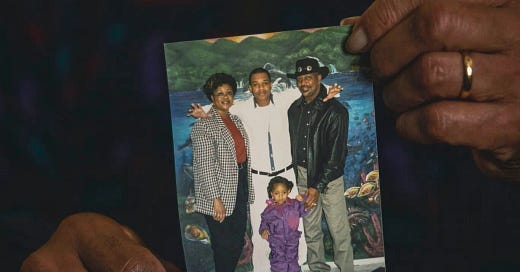Ga. lawmakers filed a bill that could've brought Jessie Askew Jr. home. It didn't get a vote
Askew is serving life without parole for a 1997 crime that injured no one while the district attorney who sent him away calls it worst mistake of his career. The bill, if passed, could help many.
Jessie Askew Sr. holding a photo that shows his son, Jessie Jr., dressed in white. Credit: Audra Melton for The New York Times
After reading the story I wrote about his long efforts to free a man from prison, Kelly Burke had a new idea.
The story, published in January in The New York Times, detailed Burke’s fight to free a man he unfairly sent to prison for life without parole for a 1997 armed robbery with no injuries. Burke, a former Middle Georgia district attorney, said he pushed for an unfair sentence because he was upset that the man wouldn’t take a plea deal. He called the hot-headed decision the biggest mistake of his 40-year career. Burke had lobbied the parole board, his predecessor DAs, testified in court about his regret, and still hadn’t found a way to help Jessie Askew Jr. go home.
Burke said the story, which mentioned “second look” laws that allow people serving disproportionate sentences to be resentenced, prompted him to contact a member of the state house. He shared the story with the lawmaker, asking him to draft a bill. The result was House Bill 894, dubbed the Georgia Second Look Act, which would allow for resentencing of those who’ve served 20 years under life without parole—if their crime wasn’t murder or rape. Because it was filed near the end of the 2025 legislative session, it didn’t make it to a vote but is expected to be taken up in 2026.
Under the current draft text, the prisoners would have to apply and, as with anything in this realm, convince a judge.
The bill is co-sponsored by state Reps. Shaw Blackmon, a Middle Georgia Republican, Scott Holcomb, Democrat of Atlanta.
Askew remains in Telfair State Prison. A judge turned down Askew’s habeas corpus petition back at Thanksgiving, and he’s appealing. He now has pro-bono help from the Southern Center for Human Rights.
Askew, 24 and a new father when he went away, was eligible for life without parole under a new “tough-on-crime” law because it was his forth felony conviction. It didn’t matter that none of his prior felonies were violent, or that even the victims of the armed robbery begged for mercy. A Telfair County judge turned Askew — and Burke — down.
As expected, Burke said he’ll push for the bill’s passage next year, too.




